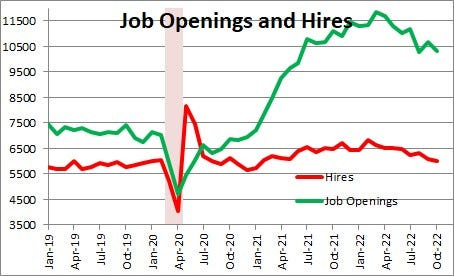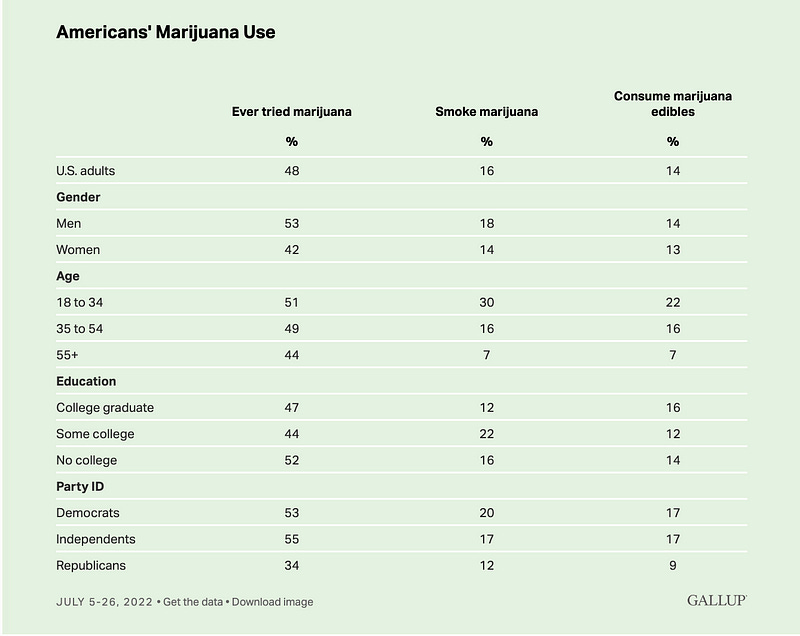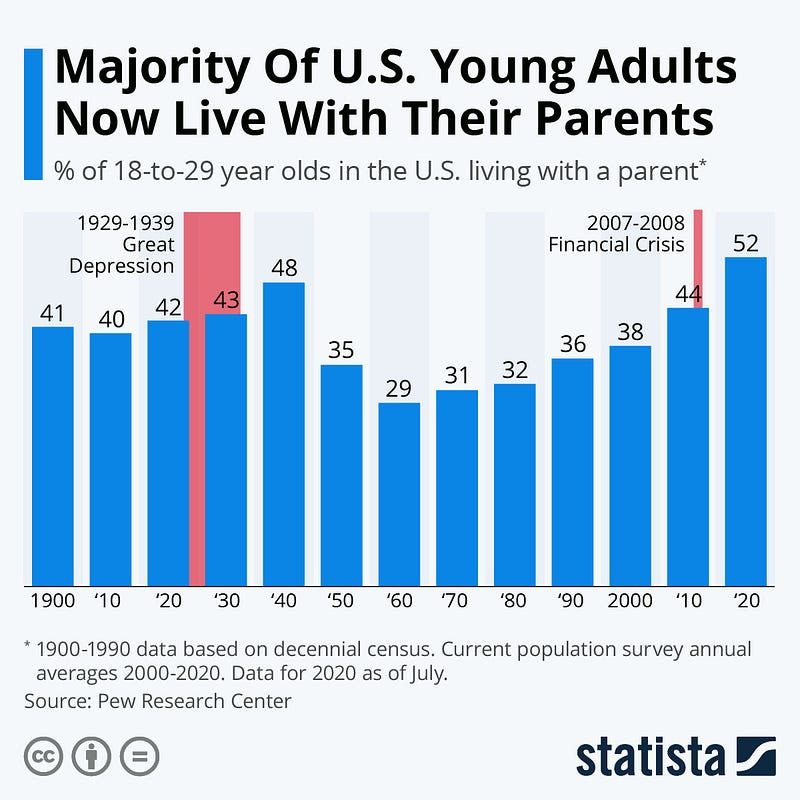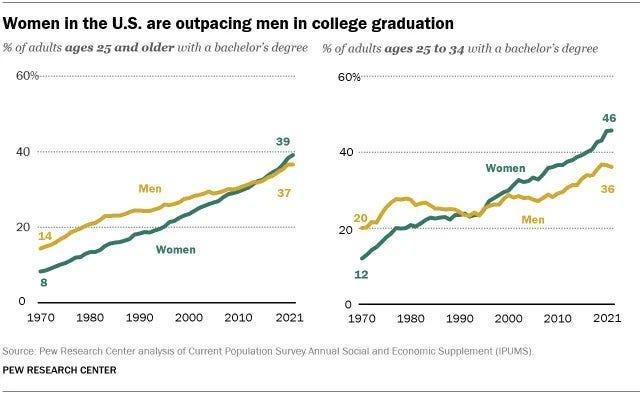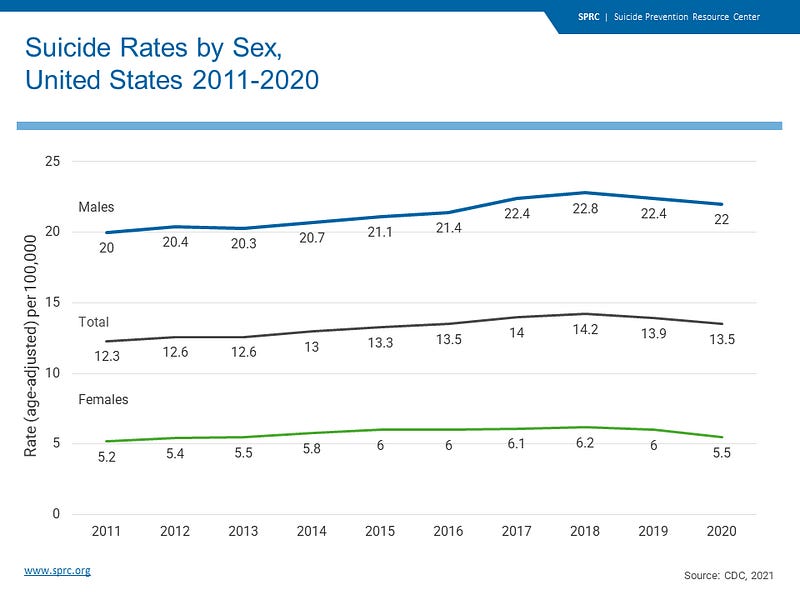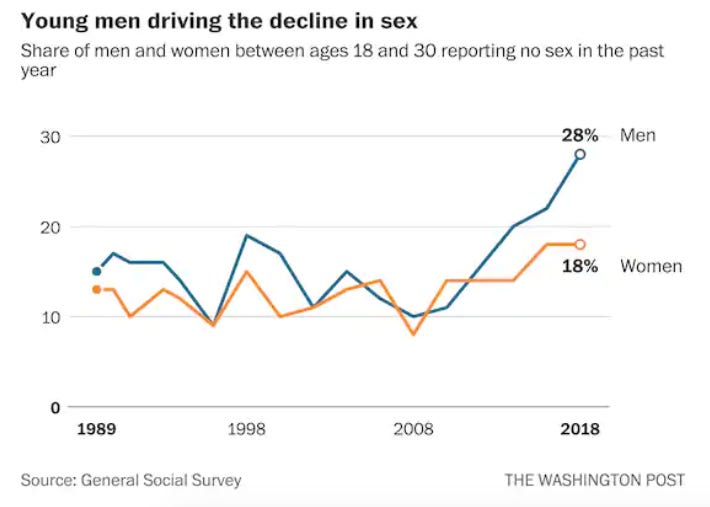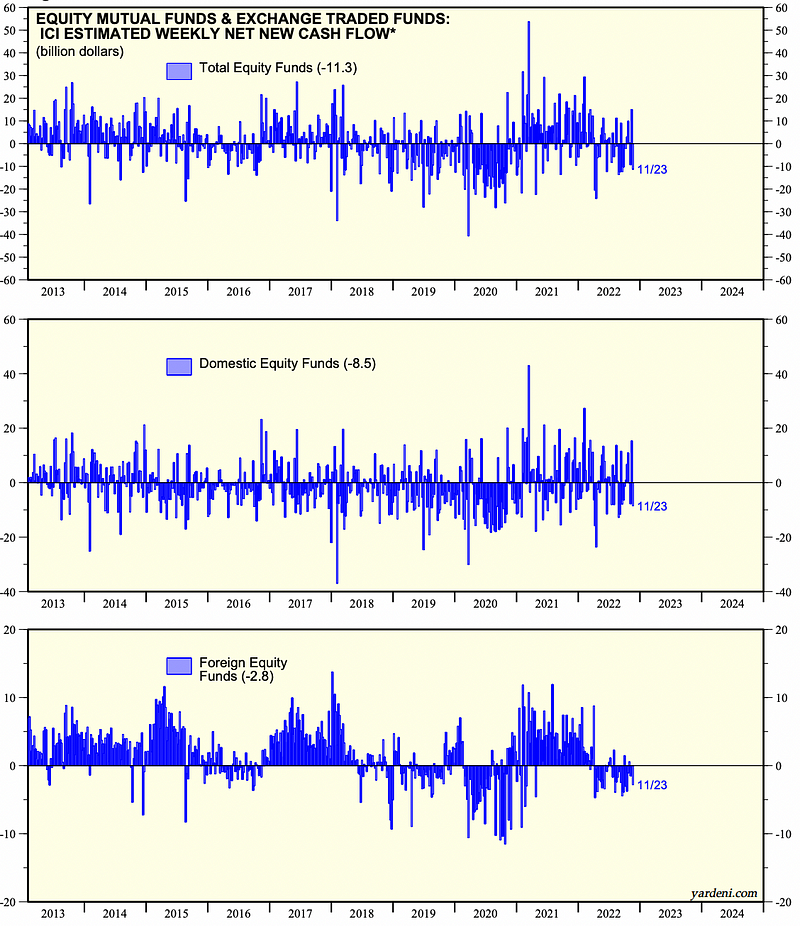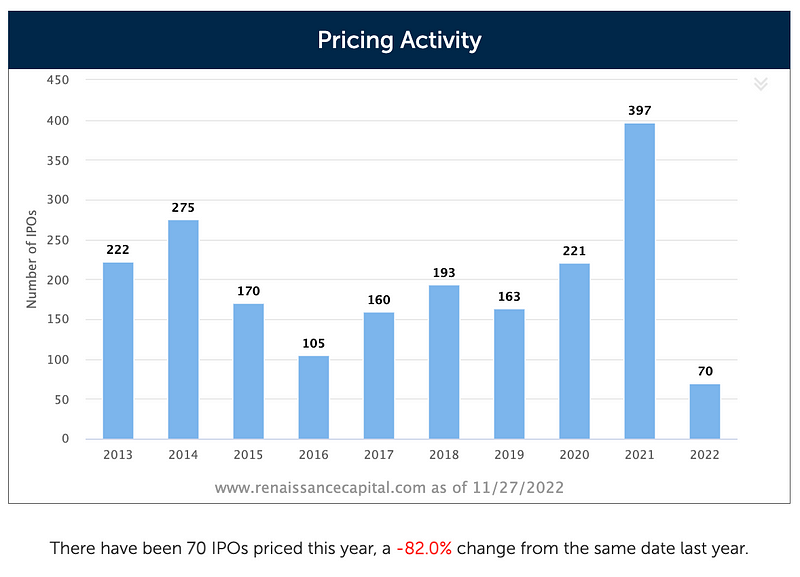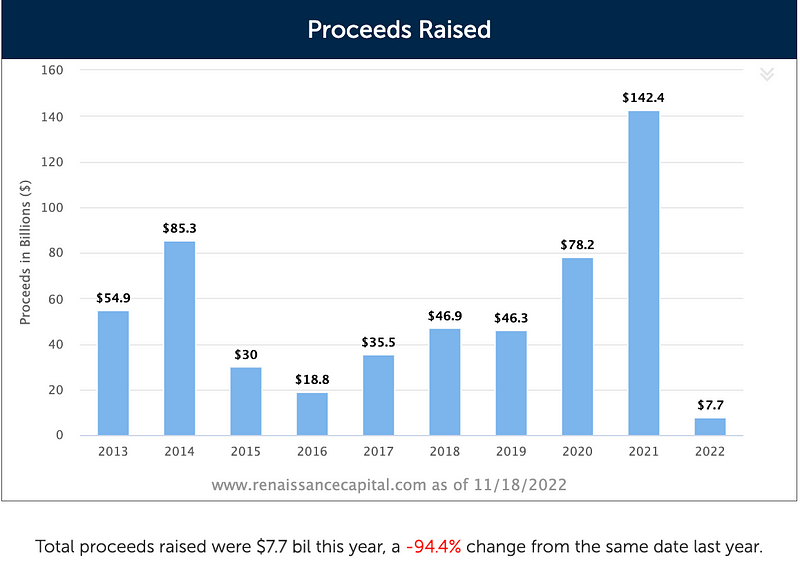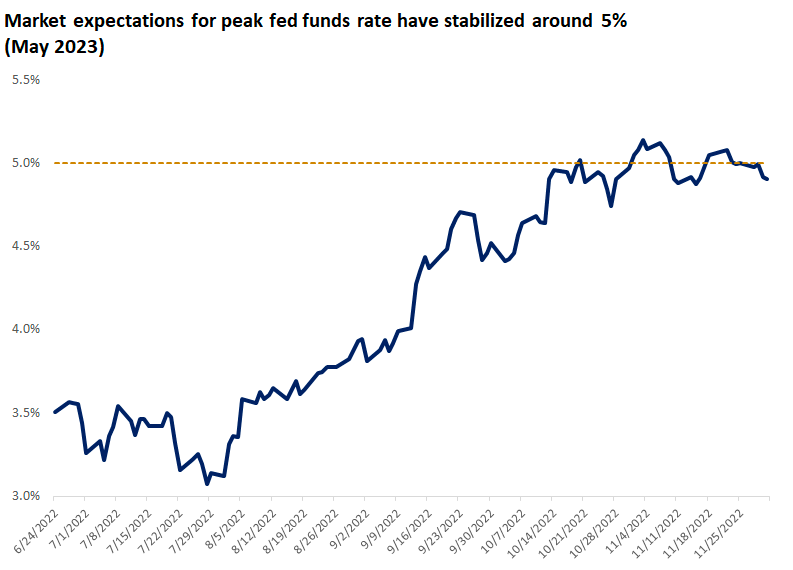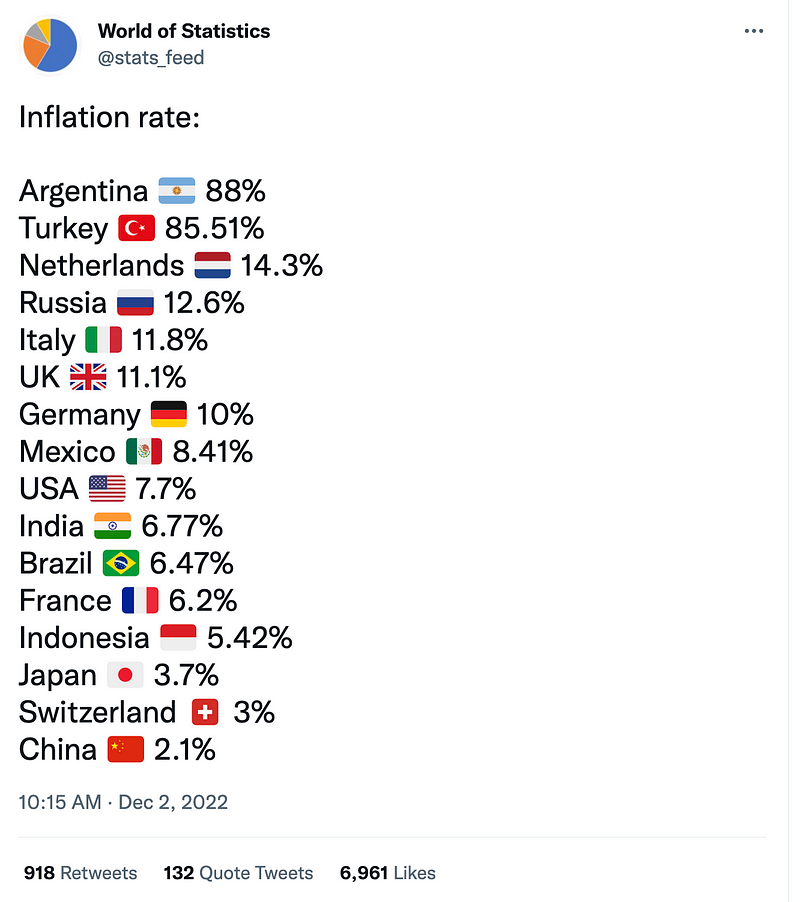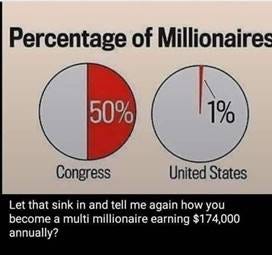EIEIO…A Few Good Men
“Where have all the good men gone…?” — Bonnie Tyler, Holding Out for a Hero
“Where have all the good men gone…?” — Bonnie Tyler, Holding Out for a Hero
“Once made equal to men, women become his superior.” — Socrates
“Women that seek to be equal with men lack ambition.” — Timothy Leary
In Wall Street logic, the booming jobs report on Friday was “bad” because it could cause the Fed to stay aggressive on the interest rate front. In fact, the 263k jobs exceeded expectations by 30%, and crushed the “whisper” estimates of 180K.
The 5.3% wage growth in November guaranteed that Jerome Powell and Co. would be raising the Fed Funds rate 50 bps to 4.25–4.5%. More sobering, the smart money was now taking the “over” bet of the 5% final rate target.
The 50 year low in the unemployment of rate of 3.7% masks a gigantic problem facing society. The persistent gap between jobs available and those seeking employment was nearly 2:1, with 11 million jobs available versus 5.6 million people seeing a job. The shortage of workers for jobs has accelerated the trend of not requiring a college degree, with just 41% of job posts necessitating a diploma for employment.
What’s going on?
Going a level deeper, it’s pretty clear and disturbing. Young men have quit working. Specifically, 7 million men ages 25–54 aren’t working or looking for work. Looked at a different way, there is only one male worker looking for a job, versus four who aren’t.
From a historical context, prime age men in the workforce is lower today than 1940 in the middle of the Great Depression when unemployment was 15%. NILF (Not in Labor Force) of 25 to 54 year olds is 3.5X greater than it was in 1965.
A variety of factors are at work including technology, knowledge skills and globalization replacing here-to-fore solid jobs. Moreover, incentives not to work enacted during Covid motivated an army of young men to stay home, get “baked” before breakfast, and play video games (30% of young adults smoke pot regularly).
Today, over 50% of men between 19 and 29 live with their parents and just 25% get their drivers license when they turn 16. For a forward view of how Universal Basic Income would work, you only have to watch the productivity of young men since the Pandemic.
The truth is, these trends have been evolving over the past fifty years, and they aren’t just confined to the United States.
In the Knowledge Economy, your education makes the difference for an individual, for a company, and for a country. There has been a flip flop in terms of percentage of college students are men versus women in since 1980. Moreover, women are 2X more likely to graduate from college and 70% of the high school valedictorians are women.
Perhaps in part due to bleak prospects, men are 3X more likely to overdose and 4X more likely to commit suicide.
In truly an existential threat, 1/3 of men under 30 haven’t had sex in the past year compared to just 1 in 10 in 2008. As Mark Twain said, “What would men be without women? Scarce, sir. Mighty scarce.”
The Peter Pan Syndrome has crossed the Pond. In Western Europe, 66% of Spanish young adults live at home, in Portugal it’s 68%. The average age of a non-married Italian male moving out of mother’s house is 39 years old. Mama Mia!
The trillions of lost economic productivity from men not working is an issue. More despairing is the lack of self worth, independence and belonging not having a job creates for a person. Our goal is to give everybody an equal opportunity to participate in the future…it starts with education but continues with a job.
Market Performance
Stocks zigged and zagged alternating between hope and fear. For the week, NASDAQ advanced 2.1%, the S & P 500 was up 1.1% and the Dow inched forward .2%. Since September, the Dow has quietly moved up 20% and the S & P 500 has gained nearly 15%. Not surprisingly, these advancements have corresponded with Treasury yields falling from 4.25% to 3.5%.
China was forefront in the news last week with protest against the zero-covid policy resulting in counterattacks by the Empire. Giving a pause to the focus on the first major uprising since Tiananmen Square was the death of former China President Jiang Zemin. Under President Jiang’s leadership, the China economy grew 3X from 1993 to 2003 with hundreds of millions being brought out of poverty. Some think Jiang’s death will further put fuel on the protesters fire. See here for a fascinating interview with President Jiang and Mike Wallace.
Speaking of China and suppression of free speech, the “Twitter Files” came out Friday night by Matt Taibbi. Whatever your political persuasion may be, or not be, this is chilling. For us to thrive as a Country, America needs to remain the home of the free and the brave.
Interestingly, after losing $1.2 trillion in Market Value in two years, Chinese stocks are rebounding with many technology stocks up over 30% since October and Alibaba up 20% last week.The logic is that President Xi sees the writing on the Wall and will need to ease on the zero-covid policies and open up China after nearly three years.
Conventional wisdom is the Market is in a “risk off” mode where current cash flows trump revenue growth and disruptive business models. Certainly, over the past 15 months, the “growthy” stocks have been destroyed.
While valuations have reflected this for months, companies are starting to feel the pressure in top line performance. This past week, Salesforce and Cloudstrike — two SaaS superstars — had disappointing earnings reports. Salesforce’s Net New ARR decreased by 2/3rds in the most recent quarter, while Cloudstrike missed thier Net New ARR projection by $12m.
However, I’m starting to believe I see a light at the end of the tunnel…hopefully it’s not a train coming at me! Next week, we will provide our Holiday Shopping List of our best investment ideas.
GSV’s Four I’s of Investor Sentiment
GSV tracks four primary indicators of investor sentiment: inflows and outflows of mutual funds and ETFs, IPO activity, interest rates, and inflation. Here’s how these four signals performed this past week:
#1: Inflows and Outflows for Mutual Funds & ETFs
Total Equity Funds decreased from (15.1) to (-11.3) from 11/16 to 11/23.
Source: Yardeni
#2: IPO Market
This past week, NASDAQ CEO Adena Friedman shared that while the IPO market is “on almost a pause,” she is “hopeful that the second half of ’23 becomes an opportunity for companies to get out.” Until then, prepare for more quiet times on the IPO front.
Source: Renaissance Capital
#3: Interest Rates
This week, Fed Chair Powell essentially confirmed that the Fed will opt for a 50 basis rate hike in December. Powell also mentioned that the rate peak will likely be somewhat higher than September forecasts (4.6%). It remains to be seen if that will be the case.
Source: Edward Jones
#4: Inflation
Jobs growth continues to remain strong in the US, as 263,000 jobs were added in November. Nevertheless, inflation continues to linger over markets around the world.
Source: Twitter
Chuckles of the Week
Article of the Week
Bill Gurley’s recent piece “Venture Capital Red Flag Checklist” has good advice for every investor and entrepreneur looking to suss out what’s BS (including SBF…)
Photo of the Week
Trojan Caleb Williams striking the Heisman pose a week before getting trounced by Utah… why being too early is the same as being wrong.
The GSV Big 10
This fall, we launched GSV’s Big 10, synthesizing the news to bring you the top 10 stories and insights in learning and skilling. In case you missed it, here are some of this week’s top stories:
#1 Employers Rethink Need for College Degrees
This is going to be a persistent trend. The four-year degree isn’t dying…but it’s finding competition. It’s “knowledge” not “college” that’s most relevant, especially in a world where companies are starving for talent. “Google U” has had over 100,000 people complete its college-alternative program.
WSJ
#2 Have the Anticapitalists Reached Harvard Business School?
As we wrote in The Mission Corporation last year, capitalism needs a refresh. While ESG has recently become SOL in the public markets, the future is clear. Curtis Welling, a professor at Dartmouth’s Tuck School of Business, asks his students every year whether capitalism needs to be reformed. A decade ago, roughly one-third said yes. This year, two-thirds said yes.
#3 Even University Presidents Lose Their Minds When Their Teens Apply to College
There’s a reason why doctors don’t operate on family members. If university presidents struggle with the college application process, then how can we expect first-generation college students to complete the process? Removing friction from this laborious process is a way to give more people equal opportunity to participate in the future.
WSJ
… for more insights on the news, subscribe to N2K and The Big 10.
EIEIO: FAST FACTS
Entrepreneurship…
42 — average age of a successful entrepreneur (Source)
$100,000 — Sam Bankman-Fried’s current bank account balance (Source)
6 million — amount of YouTube subscribers Mr. Beast gained in the last 30 days (Source)
96% — percent of female founders that fail to hit $1M in revenue (Source)
11% — amount of entrepreneurs that have bipolar disorder, 10x the national average (Source)
Innovation…
50% — share of job applications for roles offering remote work (Source)
15% — share of job postings for roles offering remote work (Source)
2.5% — percent of Indian population with a credit card (Source)
55% — percent of US population with a credit card (Source)
28% — amount of search in India that is voice (Source)
Education…
85% — percent of jobs that today’s students will have in 2030 that don’t exist yet (Source)
70% — percent of employees that say they’re “at least somewhat likely” to leave their current job for a company that invests more in employee learning (Source)
20% — percent of 16–24 year olds in China who were unemployed in July 2022 (Source)
5% — percent of 16–24 year olds in the US who were unemployed in July 2022 (Source)
$107,000 — average amount of student debt effectively forgiven through December 2024 for M.D. graduates, 10.7x more than Bachelor’s graduates — (Source)
Impact…
200,000 — number of trees planted by Treecard, which uses 80% of its profits from card interchange fees to plant trees (Source)
2% — percent of all investable assets that went to impact companies in 2020 (Source)
2.1 million — Japan annual births in 1973 (Source)
0.8 million — Japan annual births in 2021 (Source)
$1.4 billion — annual revenue from prisoner phone calls for the correctional telecom industry (Source)
Opportunity…
75% — percentage of Walmart salaried store management that started their careers in hourly jobs (Source)
8.1% — average increase in cost of living over the past year in 172 of the world’s major cities (Source)
8,000 — average change in Twitter followers for Republican politicians since Elon Musk’s takeover of Twitter (Source)
–4,000 — average change in Twitter followers for Democratic politicians since Elon Musk’s takeover of Twitter (Source)
100,000 — amount of people in the US that have completed Google’s online college-alternative program (Source)
Connecting the Dots & EIEIO…
Old MacDonald had a farm, EIEIO. New MacDonald has a Startup…. EIEIO: Entrepreneurship, Innovation, Education, Impact and Opportunity. Accordingly, we focus on these key areas of the future.
One of the core goals of GSV is to connect the dots around EIEIO and provide perspective on where things are going and why. If you like this, please forward to your friends. Onward!
Make Your Dash Count!
-MM




